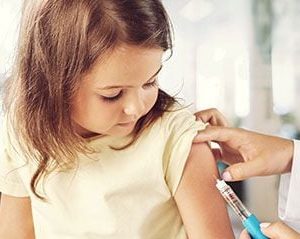- Could Your Grocery Store Meat Be Causing Recurring UTIs?
- Are You Making This Expensive Thermostat Error This Winter?
- Recognizing the Signs of Hypothyroidism
- 10 Strategies to Overcome Insomnia
- Could Artificial Sweeteners Be Aging the Brain Faster?
- Techniques for Soothing Your Nervous System
- Does the Water in Your House Smell Funny? Here’s Why
- Can a Daily Dose of Apple Cider Vinegar Actually Aid Weight Loss?
- 6 Health Beverages That Can Actually Spike Your Blood Sugar
- Treatment Options for Social Anxiety Disorder
Vaccines May Work Better if Arms Are Alternated for Each Shot

When getting vaccines, switching arms for each dose may produce greater immunity than having the jabs delivered into the same arm.
That’s the finding from a new study that looked at the first two doses of COVID vaccines. Those who alternated arms showed a small increase in immunity over those who got both shots in the same arm.
Even a small boost could be significant for folks who respond poorly to vaccines, the researchers noted.
While the findings might no longer matter much for COVID vaccines, since millions of Americans got multiple shots during the pandemic, they could have implications for all multi-dose vaccines, including childhood immunizations, the researchers said.
“I’m not making recommendations at this point, because we need to understand this a lot better,” lead researcher Dr. Marcel Curlin, an infectious disease physician at Oregon Health & Science University, told the New York Times.
But “all things being equal, we ought to consider switching up the arms,” he added.
However, extending the interval between doses — by three to four months, as was done in Canada for COVID shots — may offer an even greater benefit than switching arms does, Dr. Jennifer Gommerman, chair of the immunology department at the University of Toronto, told the Times.
Regardless, it’s worth studying all of these strategies, because in people who are immunocompromised “anything that helps their immune responses is worth doing,” she added.
In the new study, Curlin and his colleagues measured antibody levels in 54 pairs of university employees matched for age, gender and the time after vaccination.
The participants were randomized to get the second dose in the same arm as the first dose or in the opposite arm. Switching the arms increased blood antibody levels by as much as fourfold, the scientists found.
The immune response was also stronger against both the original coronavirus and the Omicron variant.
“It’s a consistent, statistically significant effect; is pretty sizable; and it seems to be quite durable,” Curlin said.
More information
Visit the U.S. Centers for Disease Control and Prevention for more on vaccines.
SOURCE: Journal of Clinical Investigation, Jan. 16, 2024; New York Times
Source: HealthDay
Copyright © 2026 HealthDay. All rights reserved.










